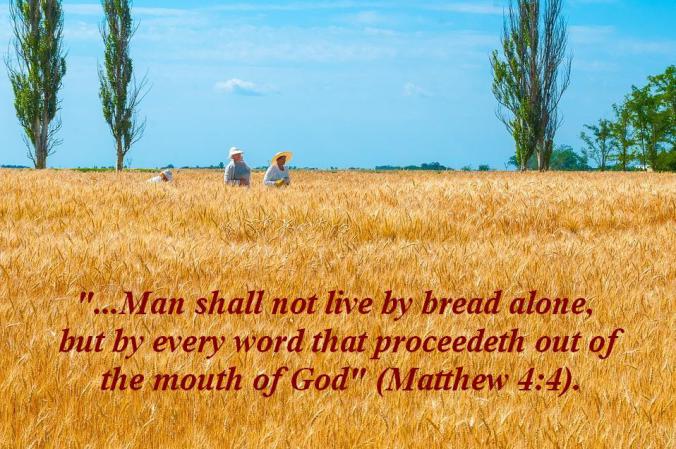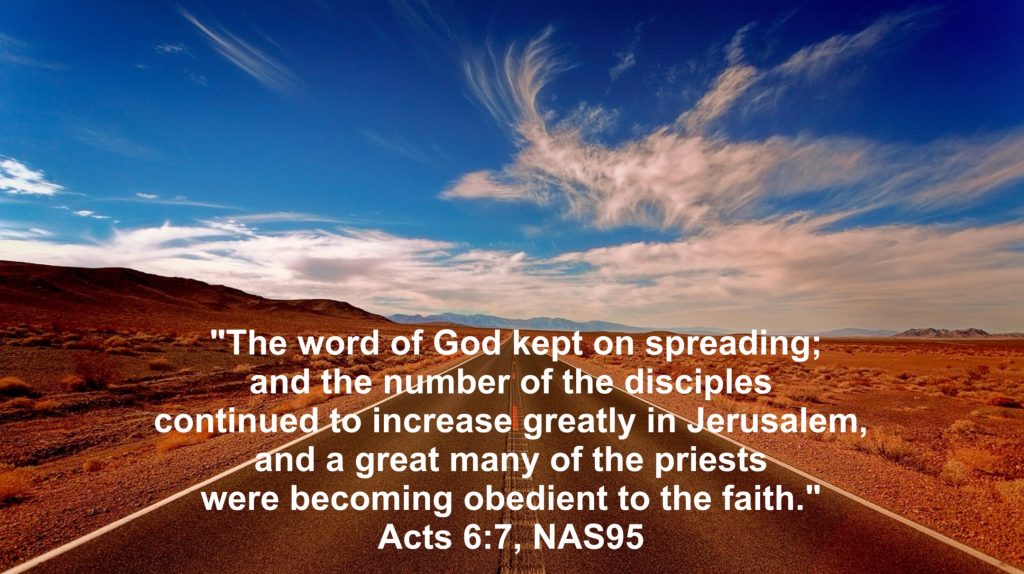“Go therefore and make disciples of all the nations…teaching them to observe all that I commanded you; and lo, I am with you always, even to the end of the age” (Matthew 28:19-20, NASB).
——————–
Contents:
1) When the Holy Spirit Speaks: Strong Feeling–or Words? (Kyle Pope)
2) “You Have Need of Endurance” (Jesse A. Flowers)
——————–

-1-
When the Holy Spirit Speaks:
Strong Feeling–or Words?
Kyle Pope
In our discussions with friends in the religious world, it is not uncommon to hear people claim that the Holy Spirit has led them to do or to say something. Many such people believe strongly that the Holy Spirit leads them in a direct manner, separate from the guidance found in the Bible. When questioned, in most cases, what they really mean by this is that they have felt a strong feeling within that led them to say or do something. It is always important to test all things by the standard of Scripture. On this issue, this is especially important, lest we find ourselves in the same position as the false prophets in the days of Ezekiel, “who follow their own spirit and have seen nothing” (Ezekiel 13:3).
Are there times in Scripture when the Holy Spirit spoke to Christians through a strong feeling? As a test case we can survey the accounts in the New Testament in which we are told that the Holy Spirit spoke. As a record of the early church, and a history of the Holy Spirit’s work in the church, how does it describe the Spirit’s guidance to Christians?
There are six instances in which such direct guidance is recorded. The first example relates to the preaching of Philip to the Ethiopian nobleman. When he saw this man in his chariot, Scripture tells us: “Then the Spirit said to Philip, ‘Go near and overtake this chariot’” (Acts 8:29). We notice that the Spirit’s communication to Philip was clear, concrete, and in the form of a complete sentence. A second example occurred when Peter saw the vision of the sheet lowered from heaven with animals in it. Scripture records: “While Peter thought about the vision, the Spirit said to him, ‘Behold, three men are seeking you. Arise therefore, go down and go with them, doubting nothing; for I have sent them’” (Acts 10:19-20). Here we see two complete sentences. One sentence expresses knowledge of things beyond Peter’s senses (i.e. there were three men). The second sentence commands certain behavior. These were not just vague feelings but clear revelations and instructions.
Two examples concern the prophet Agabus. The first reveals: “And in these days prophets came from Jerusalem to Antioch. Then one of them, named Agabus, stood up and showed by the Spirit that there was going to be a great famine throughout all the world, which also happened in the days of Claudius Caesar” (Acts 11:27-29). While this account does not reveal the specific words of the Spirit, the nature of the revelation indicates a great level of specificity. We note that the Spirit revealed to him there would be 1) “a famine”; 2) it would be “great”; and 3) it would span “throughout all the world.” The second came when Paul was returning to Jerusalem. The text records:
And as we stayed many days, a certain prophet named Agabus came down from Judea. When he had come to us, he took Paul’s belt, bound his own hands and feet, and said, Thus says the Holy Spirit, “So shall the Jews at Jerusalem bind the man who owns this belt, and deliver him into the hands of the Gentiles” (Acts 21:10-12).
In this revelation there is not only a complete sentence but the command from the Spirit to the prophet to use a prop—Paul’s belt, to illustrate what would happen to him. We see this is much more than a strong motivation within the heart of Agabus. It is clear communication in words.
Two final examples both concern Paul. While in Antioch, we learn about prophets in the church in that city. Of these prophets, Scripture records: “As they ministered to the Lord and fasted, the Holy Spirit said, ‘Now separate to Me Barnabas and Saul for the work to which I have called them’” (Acts 13:2-3). Here the Spirit identifies men by name—“Barnabas and Saul.” Here the Holy Spirit commands their appointment for a specific work. These are words that were spoken, recorded, and understandable. A final example echoes what would be declared by Agabus. Paul relates: “And see, now I go bound in the spirit to Jerusalem, not knowing the things that will happen to me there, except that the Holy Spirit testifies in every city, saying that chains and tribulations await me” (Acts 20:22-23). Here, once again, the Spirit used clear words declaring that “chains” and “tribulations” awaited Paul. This was clearly not strong feeling; it was communication that could be recorded, written down, and clearly understood.
There is no question that the apostles were promised that the Holy Spirit would speak through them (Mark 13:11). There is also no question that the apostles were promised that the Holy Spirit would directly guide them (John 16:13). Yet, these promises were not to all believers—the means through which the Holy Spirit guides believers in general is through the word of God, the “sword of the Spirit” (Ephesians 6:17). The pattern of Scripture is that when the Holy Spirit did speak directly to believers it was in words, “which the Holy Spirit speaks” (1 Corinthians 2:13). Any strong inclination of the heart that does not follow this pattern cannot reliably be viewed as the guidance of the Holy Spirit.
— Via Faithful Sayings, Volume 19, Issue 9 (February 26, 2017)
——————–

-2-
“You Have Need of Endurance”
Jesse A. Flowers
“Therefore do not cast away your confidence, which has great reward. For you have need of endurance, so that after you have done the will of God, you may receive the promise” (Heb. 10:35-36).
Every single Christian has need of endurance. The Greek word for endurance (hypomone) has been defined as: “Steadfastness, constancy, endurance. In the New Testament the characteristic of a man who is not swerved from his deliberate purpose and his loyalty to faith and piety by even the greatest trials and sufferings. Patiently and steadfastly; a patient, steadfast waiting for; a patient enduring, sustaining, perseverance” (Interlinear, Blue Letter Bible).
We have need of endurance because we will all experience various hardships in this life. Those hardships may be financial, physical, emotional, mental, or even spiritual in nature. Paul exhorted Timothy, “You therefore must endure hardship as a good soldier of Jesus Christ” (2 Tim. 2:3).
We have need of endurance because we will all experience times of weariness and discouragement. The author of Hebrews encourages his readers to consider Jesus “who endured such hostility from sinners against Himself, lest you become weary and discouraged in your souls” (12:3). Paul wrote to the brethren throughout Galatia: “And let us not grow weary while doing good, for in due season we shall reap if we do not lose heart” (Gal. 6:9). What shall we reap if we do not lose heart (or give up)? If we faithfully sow to the Spirit, we will reap everlasting life (Gal. 6:8).
We have need of endurance because the spiritual race to heaven is long. “Therefore we also, since we are surrounded by so great a cloud of witnesses, let us lay aside every weight, and the sin which so easily ensnares us, and let us run with endurance the race that is set before us” (Heb. 12:1). This race set before us is not a sprint but a spiritual marathon. Thus, we need that steadfastness, constancy, patient enduring, sustaining, and perseverance if we are going to ultimately cross the finish line as victors.
Our Lord declared: “But he who endures to the end shall be saved” (Matt. 24:13). So dear brother or sister, do not cast away your confidence. Why not? Because it has great reward! Each one of us has need of endurance. For after we have done the will of God, we will receive the promise of life eternal in Heaven!
— Via Articles from the Knollwood church of Christ, December 2025
——————–
The Steps That Lead to Eternal Salvation
1) Hear the gospel — for that is how faith comes (Rom. 10:17; John 20:30-31).
2) Believe in the deity of Jesus Christ, the Son of God (John 8:24; John 3:18).
3) Repent of sins. For every accountable person has sinned (Romans 3:23; Romans 3:10), which causes one to be spiritually dead (Ephesians 2:1) and separated from God (Isaiah 59:1-2; Romans 6:23). Therefore, repentance of sin is necessary (Luke 13:5; Acts 17:30). For whether the sin seems great or small, there will still be the same penalty for either (Matt. 12:36-37; 2 Cor. 5:10) — and even for a lie (Rev. 21:8).
4) Confess faith in Christ (Rom. 10:9-10; Acts 8:36-38).
5) Be baptized in water for the remission of sins (Mark 16:16; Acts 2:38; 22:16; 1 Pet. 3:21). This is the final step that puts one into Christ (Gal. 3:26-27). For from that baptism, one is then raised as a new creature (2 Cor. 5:17), having all sins forgiven and beginning a new life as a Christian (Rom. 6:3-4). For the one being baptized does so “through faith in the working of God” (Col. 2:12). In other words, believing that God will keep His word and forgive after one submits to these necessary steps. And now as a Christian, we then need to…
6) Continue in the faith by living for the Lord; for, if not, salvation can be lost (Matt. 24:13; Heb. 10:36-39; Rev. 2:10; 2 Pet. 2:20-22).
——————–
Tebeau Street
CHURCH OF CHRIST
1402 Tebeau Street, Waycross, GA 31501
Sunday: 9 a.m. Bible Classes and 10 a.m. Worship Service
Wednesday (all but the first): 7 p.m. Bible Classes
First Wednesday of the month: 7 p.m. Congregational Song Service (about 45 minutes of singing, followed by a short talk)
evangelist/editor: Tom Edwards (912) 281-9917
Tom@ThomasTEdwards.com
https://thomastedwards.com/go/all.htm (This is a link to the older version of the Gospel Observer website, but with bulletins going back to March 4, 1990.)















